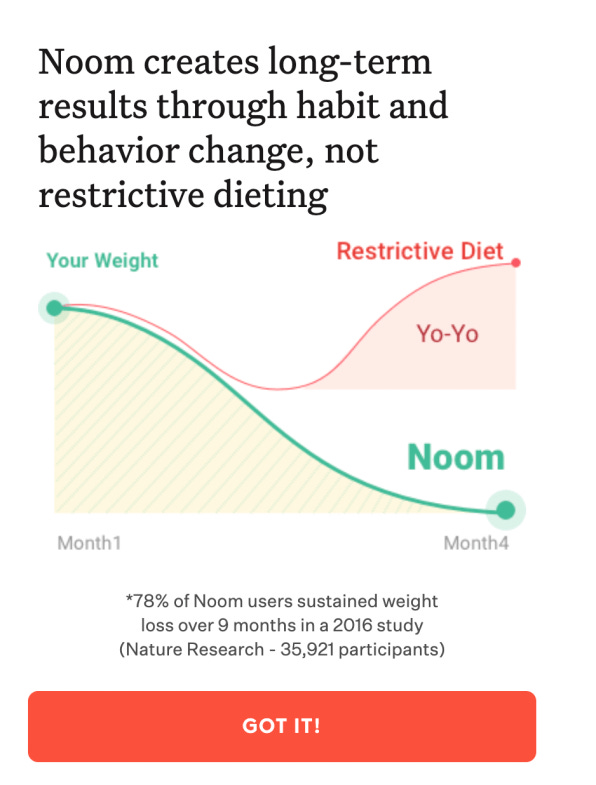This is the Weight and Healthcare newsletter! If you appreciate the content here, please consider supporting the newsletter by subscribing and/or sharing!
Noom has become ubiquitous in the diet space. But do their claims stand up to scrutiny?
I originally wrote about them in 2020. One of the first things I noticed was that their commercials are chock full of diet advice that is as old as the hills and has no research to back it as actually creating sustained weight loss. (“Eat grapes instead of raisins, drink wine instead of beer, drink a glass of water if you’re hungry, blah blah blah) a lot of the marketing seems to be based on the old “eat watery, high fiber, bulky food so you’ll feel fuller” advice that doesn’t work because your body is a more sophisticated machine than, say a lawnmower. 1987 called, and they want their crappy diet advice back.
The very first thing I noticed though, was that they were claiming to be a brand new way to lose weight while also claiming that they can help you keep weight off for good. These two statements are mutually exclusive. Either you are brand new, or you have data proving long-term efficacy. It can’t be both.
Remember that almost any diet can show short-term weight loss, but about a century of data shows that almost everyone regains their weight within five years, so short-term results mean, essentially, nothing. Given that, let’s examine Noom’s claims.
Their original claim of “weight loss for life” was based on a study showing that 78% of users in 2016 had “sustained” weight loss… over 9 months.
It should be noted that the graph that accompanies the claim only shows 4 months, making me think that people started to regain at the four-month mark and that they are borrowing from Weight Watchers trick of saying “participants regained weight but remained below their starting weight” in order to call this “sustained” weight loss. Of course, the graph they created also doesn’t have any information about how much weight was lost, which does not engender confidence. The graph shows Noom comparing favorably to something they are calling “restrictive diet” but they don’t offer any information as to what that would be.
I looked up the actual study and found that what the study (Successful weight reduction and maintenance by using a smartphone application in those with overw*ight and ob*sity) actually says is that “77.9% reported a decrease in body weight while they were using the app (median 267 days; interquartile range = 182).” I’m not sure that “decrease in body weight” is the same thing as “sustained weight loss” but, regardless, we’re still only talking about nine months.

I would imagine the reason they are still touting less than 80% of people managing to lose weight for 9 months in 2016 (rather than, say having followed people until now,) is that almost all of those people are having the exact same experience of almost every other dieter – losing weight in the first year, and then gaining it back in years 2-5.
But, again, I wrote about that two years ago, surely they have longer-term follow-up now. Right?
Not so much.
One of the “longest” studies they cite (Self-Reported Nutritional Factors Are Associated with Weight Loss at 18 Months in a Self-Managed Commercial Program with Food Categorization System: Observational Study) looks at outcomes at 4 and 18 months. There are many issues with the study design and methods that are beyond the scope of this article, but the participant numbers are pretty telling.
They started with 9,261 participants who met the basic criteria
signed up for the Noom “Healthy Weight” program in June 2019
located in the United States
Body mass index (BMI) of 25 or higher
Still on the program at 4 months
Of the 9,261, only 2,887 had managed to lose 5% or more of their body weight in four months (and I’ll note that they are falling into the mistake of calling 5% “clinically significant.”) There were 374 participants who were still within 1% of their starting weight, and they were used as a control group. So that’s 3,261 involved in the study. (The 6,000 who had lost between 1% and 5% of their starting weight were excluded.)
At the 18-month mark, the 3,261 people had dwindled down to only 803 who were still on Noom. The study says “Retention through the study was low but comparable to the low range for other weight loss interventions.” Said another way, Noom fails in the same way that other weight loss interventions fail.
Did I mention that the authors of this study are “employees of Noom Inc. and have received salary and stock options for their employment”? That does not distinguish this study from most of Noom’s research.
As I’ve written about previously, anything less than five years of follow-up for an intentional weight loss method is essentially useless. Noom isn’t even close to that.
Noom has marketed hard to try to claim that they are something different, but the truth is that they are just more of the same - short-term studies by company employees that are not remotely large enough or long enough to back up their claim that they help people “lose weight and keep it off for good.”
Did you find this newsletter helpful? You can subscribe for free to get future newsletters delivered direct to your inbox, or choose a paid subscription to support the newsletter and get special benefits! Click the Subscribe button for details:
Like this piece? Share this piece:
More Research
For a full bank of research, check out https://haeshealthsheets.com/resources/
*Note on language: I use “fat” as a neutral descriptor as used by the fat activist community, I use “ob*se” and “overw*ight” to acknowledge that these are terms that were created to medicalize and pathologize fat bodies, with roots in racism and specifically anti-Blackness. Please read Sabrina Strings: Fearing the Black Body – the Racial Origins of Fat Phobia and Da’Shaun Harrison: Belly of the Beast: The Politics of Anti-Fatness as Anti-Blackness for more on this.




My dear cousin fell hard for Noom. He lost something like 70 pounds over about a year, and started walking around 8 miles a day. (He retired right at the same time, so he has time for all that walking now.) He began Noom just about 2 1/2 years ago. Until about 6 months ago, he was texting at least once a week about his weight, how great he felt, etc. Then, suddenly, no more mentions of Noom or weight loss. I haven't seen him in person in over a year, but my STRONG bet is that the regain has started and that he's falling into the trap of thinking it's his "fault" and feeling ashamed and embarrassed. (Been there, done that -- far too many times.)
The whole thing was really awkward because he so clearly expected and wanted praise and affirmation for his weight loss, which I just could not in good conscience give him. Now I'll have to figure out how to be supportive as he regains weight, without seeming to imply that he was a sucker to fall for Noom in the first place.
Oh Noom. I could for talk days about experience working for them- but they made me sign an NDA after voluntarily leaving. 🙄